2012 election
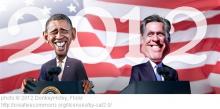
"In a democracy, the people get the government they deserve." – Alexis de Tocqueville
With the Democratic and Republican national conventions behind us, and an increase of political campaigning in front of us, we recognize the timeliness of the above quotation from Alexis de Tocquville. In a democracy the citizens choose their government, thus we indeed receive the government we deserve. As Lisa Sharon Harper recently stated:
"In its purest form, politics is simply how we organize our life together in society…in a Democratic Republic like our own, the [people are] ultimately responsible for the policies, laws, and structures that guide daily life. As we vote for candidates and ballot measures, we shape our society."
With such thoughts in mind, we affirm the collective ability to “shape our society," but we do so not only through the ability to choose our candidates and pass ballot measures, but we also possess the capacity to shape the process of how our leaders and policies are selected. In other words, while many complain about the high quantity and low quality of political campaigns, we are confronted with a harsh reality: In a democracy, we get the political campaigns we deserve.
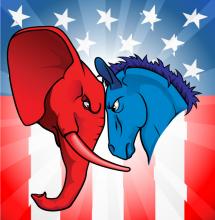
Someone asked me recently what I thought of something “as a member of the Christian Left.” My insides tightened and screeched into a ball. It was as if Freddy Krueger had run his sharpened fingernails across the black board in history class. Christian Left? Left of what? When did I sign that membership card?
Maybe it’s the title of my last book, Left, Right and Christ: Evangelical Faith in Politics, which was co-written with a Tea-Partier who is also an evangelical Christian. The book does frame me as the one on the left, but if you read my chapters you’ll see that is not my mind or my heart.
In times like these, when politicians are sweating to sway voters to their side, or frame their opponents as the polar opposite—the enemy—it is tempting to begin to define ourselves and each other through the frame of politics. We place each other in convenient little political boxes—boxes not made by scripture or the church, but by politicians and the media.

I’ll be honest … I’m a coward. During the political season I find myself avoiding certain conversations that I do care about. Mind you, I do have opinions. My wife would say I have an opinion on everything. Faith and social issues are extremely important to me, and I have spent a lot of years studying and following the trends and their impact on people I care a lot about. I am especially focused on issues that affect the poor, mentally ill, unemployed, addicted, and homeless. Topics of Medicare, unemployment benefits, the death penalty, gun control, abortion, gay marriage, state and federal budget and deficits, immigration, and foreign policy all matter to me. I do have opinions! (And I vote!)
Yet during the final months of America’s presidential street fight, I tend to lay low. I know that one simple conversation with almost anyone can turn volatile and unleash the beast within them. If educated congressmen, presidential candidates, governors, and even local representatives can be as nasty and polarized as they have publicly shown, there is little reason to honestly discuss an issue, since the potential for alienation and misrepresentation is at an all-time high. No one seems to be listening, having crystallized their presuppositions with a crafty skill of spinning any topic into their agenda. Ironically, our children are watching adult leaders model behavior we wouldn’t let them get away with.
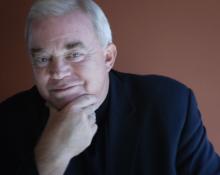
There is hardly a more controversial political battle in America today than that around the role of government. The ideological sides have lined up, and the arguments rage about the size of government: how big, how small should it be? Some famously have said government should be shrunk so small that it "could be drowned in a bathtub."
But I want to suggest that what size the government should be is the wrong question. A more useful discussion would be about the purposes of government and whether ours is fulfilling them. So let's look at what the Bible says.
The words of Paul in the 13th chapter of Romans are perhaps the most extensive teaching in the New Testament about the role and purposes of government. Paul says those purposes are twofold: to restrain evil by punishing evildoers and to serve peace and orderly conduct by rewarding good behavior. Civil authority is designed to be "God's servant for your good" (13:4). Today we might say "the common good" is to be the focus and goal of government.
So the purpose of government, according to Paul, is to protect and promote. Protect from the evil and promote the good, and we are even instructed to pay taxes for those purposes. So to disparage government per se — to see government as the central problem in society — is simply not a biblical position.

ST. LOUIS — Don Hinkle stands out among the serious, conservative men of the Missouri Baptist Convention. Not that Hinkle isn't conservative or serious. He is both. But Hinkle prefers bow ties, which — along with his white, furry mustache and thatch of white hair — give him a sort of plump Mark Twain air.
Late last week, a church-state watchdog group in Washington filed a complaint with the Internal Revenue Service accusing Hinkle, who is also his organization's director of public policy, with violating federal tax law by intervening in two campaigns for public office.
Those were the Republican primary campaigns of U.S. Rep. Todd Akin for U.S. Senate, and Ed Martin for Missouri attorney general.
The 500,000-member Missouri Baptist Convention is the state arm of the Southern Baptist Convention, the largest Protestant denomination in the country, with about 16 million members.
In his column in the May edition of the Pathway, the state convention's newsjournal, Hinkle wrote that while he did not want an American theocracy, "when it comes to public policy, Southern Baptists must be motivated by love for our fellow citizens, believing that God's way is the best way."
For that reason, Hinkle continued, "I personally support candidates like U.S. Rep. Todd Akin, a Republican who wants to challenge Democrat Claire McCaskill for her U.S. Senate seat, and Republican Ed Martin, the St. Louis attorney who is running for state attorney general."
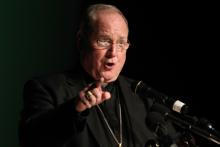
In a move that could recast the reigning political narrative about the Catholic bishops, Cardinal Timothy Dolan has accepted an invitation to deliver the closing benediction at the Democratic National Convention, a week after he gives a similar blessing to the Republicans in Tampa, Fla.
From the start, Dolan, who is also president of the U.S. Conference of Catholic Bishops, made it clear that he would be willing to pray at the Democratic convention. There were doubts, however, that the Democrats would invite Dolan.
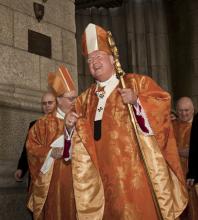
NEW YORK — Cardinal Timothy Dolan, who sparked controversy by agreeing to deliver the closing blessing at the Republican convention in Tampa this week, on Monday drew further attention to his political role by asking both Mitt Romney and Barack Obama to sign a “civility pledge” promoted by a leading conservative Catholic activist.
The archbishop of New York wrote to Romney and Obama, as well as their running mates, Paul Ryan and Joe Biden, asking them to sign the “Civility in America” pledge developed by Carl Anderson, head of the powerful Knights of Columbus and a man with long-standing ties to the Republican Party.
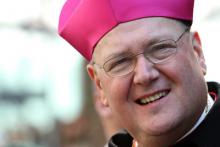
The news that New York Cardinal Timothy Dolan, the nation’s most prominent Catholic prelate, will deliver the closing blessing to the Republican National Convention in Florida next week was seen as a huge coup for Mitt Romney, the party's presumptive nominee. But the move has also prompted a sharp debate within the church over the increasingly close ties between leading bishops and the GOP.
“The cozy relationship between a sizable portion of U.S. bishops and the Republican Party should be cause for concern, and not just among progressive Catholics,” Michael O’Loughlin wrote in a post on the website of America magazine, a leading Catholic weekly published by the Jesuits.
“Cardinal Dolan’s appearance in Tampa will damage the church’s ability to be a moral and legitimate voice for voiceless, as those who view the Catholic Church as being a shill for the GOP have just a bit more evidence to prove their case,” O'Loughlin concluded.
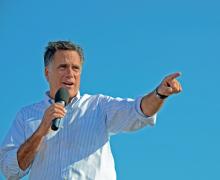
Mitt Romney says in a new interview that one of the reasons he’s distressed about disclosing his tax returns is that everyone sees how much money he and his wife, Ann, have donated to his Mormon church, and that’s a number he wants to keep private.
“Our church doesn’t publish how much people have given,” Romney tells Parade magazine in an edition due out on Aug. 26. “This is done entirely privately. One of the downsides of releasing one’s financial information is that this is now all public, but we had never intended our contributions to be known. It’s a very personal thing between ourselves and our commitment to our God and to our church.”
Romney has released his 2010 tax returns in his White House campaign and, so far, a summary of last year’s tax information. But despite pressure from Republican opponents in the primaries and President Obama’s re-election campaign, Romney has refused to disclose more.
While it may not be a major reason, Romney says disclosing his charitable donations isn’t something he wants to do.

Shrill voices, backed by vast ad spending, are trying to turn Americans against each other. And not just in vocal and behavioral disagreement, but to a depth of fear and hatred that could turn violent with little provocation.
Is it working?
To judge by the shrill echoes of shrill voices, the right wing is arming for battle, with God on their side, the flag as their shield, and the future of a white Christian nation at stake. Foolhardy politicians egg them on, and the greedy rich seem to believe that they can turn this hatred on and off to suit their quest for tax breaks.
Do the shrill represent any force larger than their own passions? Will the common-sense middle prove more durable and extensive than zealots want to believe?

The 2012 presidential campaign could bear a new subtitle: A Tale of Two Catholics.
For the first time in U.S. history, both sides of the ballot include Roman Catholics: Democrats’ Vice President Joe Biden, and Republicans' newly named vice presidential candidate Paul Ryan.
Ryan, 42, still belongs to the Catholic parish, St. John Vianney in Janesville, Wis., where he was an altar boy. Biden, 69, the first Catholic vice president in U.S. history, attends Mass at St. Patrick’s Parish and St. Joseph on the Brandywine Church, both in Wilmington, De.
Biden and Ryan both cite their faith as a formative influence, but neither is known as a standard-bearer for the Catholic hierarchy’s chief political causes: abortion and gay marriage. In fact, the two candidates are — politically at least — nearly polar opposites.
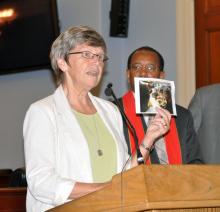
Sister Simone Campbell sat down with Fox News' Bill O'Reilly to discuss her organization's push for a faithful budget.
Campbell, executive director of NETWORK, recently invited presidential candidate Mitt Romney to join the Nuns on the Bus in some of their charitable work with the poor.
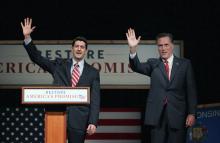
Republican presidential candidate Mitt Romney announced Rep. Paul Ryan as his vice presidential pick early Saturday morning. Romney is set to officially announce the Wisconsin representative at 9 a.m. in Norfolk, Va.
Romney made the announcement via his smartphone app, and his website refers to the duo as the "A" team, saying: "This is the team to beat. This is the team that can restore greatness in America. This is the team that can fix America."
Visit NBCNews.com for breaking news, world news, and news about the economy
Republican presidential candidate Mitt Romney accused Democratic President Barack Obama of launching a “war on religion” in a television ad released on Aug. 9.
“President Obama used his health care plan to declare war on religion, forcing religious institutions to go against their faith,” the ad’s announcer states.
The ad pans to a shot of Romney on his recent visit to Poland saying, "In 1979, a son of Poland, Pope John Paul II, spoke words that would bring down an empire. Be not afraid."
It concludes, “When religious freedom is threatened, who do you want to stand with?”

Michael Goldstein voted for Barack Obama in 2008 and supports gay marriage and an assault weapons ban. Before moving to New Jersey 11 years ago to raise a family, the Brooklyn native fit right in with other lifelong Democrats in Manhattan’s Upper West Side.
But Goldstein now says he has buyer’s remorse. And last week the 48-year-old East Brunswick man became the face and voice of a national campaign aimed at converting fellow Jews who voted for Obama four years ago into supporters of Republican Mitt Romney.
In a video on the Republican Jewish Coalition website, Goldstein talks about his disappointment in Obama’s handling of the economy and U.S. relations with Israel.
“I was a big Obama supporter. I really believed in him and believed in what he stood for,” Goldstein says in the video. But, he continues, “when he gave the speech about the ’67 borders, it was nothing that had come up in his campaign originally. That really changed my mind about him.”
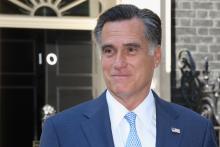
Though Mitt Romney talks little about his faith on the campaign trail, he grew up in the Mormon Church and spent years as a top church leader in Massachusetts. From 1986 to 1994, he was president of the Boston stake, an entity similar to a Catholic diocese. Before that, Romney was bishop, similar to a lay pastor, of congregations in Belmont and Cambridge. Each job included both organizational work and counseling.
After leaving the stake president position, Romney taught Sunday school for a year, then oversaw the church’s programs for teenagers for around two years. Romney continues to tithe — giving 10 percent of his income to his church. In accordance with Mormon teachings, he does not drink alcohol, tea or coffee. He attends church services when he can. Romney's campaign did not respond to requests for comment on this story.
As a church leader, Romney ran the church with businesslike efficiency.
“He was very serious about doing an excellent job about things and he didn’t suffer fools,” said Helen Claire Sievers, executive director for the Harvard-affiliated WorldTeach, who was active in the church when Romney was stake president.
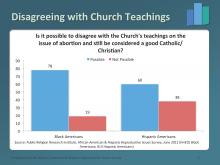
The influence of clergy in swaying their congregants' attitudes about moral issues like abortion and contraception access is dwindling, according to a new study.
The Religion, Values, and Experiences: Black and Hispanic American Attitudes on Abortion and Reproductive Issues survey, conducted by the Public Religion Research Institute, shows that there continues to be a disconnect in personal, moral belief and feelings about public policy.
"What they're hearing at church is not the big mover on attitudes of legality of abortion," Robert Jones, PRRI CEO, said.
While 51 percent of black Americans believe abortion is morally wrong, 67 percent say it should be legal in all or most cases.
"I really think that freedom of choice is probably one of the most precious components of what it means to be a Christian. Blacks have been quite possessive and reflective of this fact," said Dr. Stacy Floyd-Thomas, associate professor of Ethics and Society at Vanderbilt University's Divinity School. "… You do have the majority saying that they might see it as a sin or they are against it, but you still have the right."
Both groups believe it is possible to disagree with church teaching and be a good Catholic or good Christian. Jones pointed to the growing trend of personal versus external focus. Previous surveys have shown that attitudes about religion are mostly influenced by people's own beliefs and behaviors rather than institutional doctrine.

A new poll released today shows an overwhelming percentage of black and Hispanic voters favor Barack Obama over Mitt Romney in the upcoming presidential election — 87 percent and 58 percent, respectively. Both groups say the economy is a critical issue in the election.
The Religion, Values, and Experiences: Black and Hispanic American Attitudes on Abortion and Reproductive Issues survey, conducted by the Public Religion Research Institute, also showed that two-thirds of black Americans believe abortion should be legal in all or most cases, while only 46 percent of Hispanic Americans agreed.
Both black and Hispanic Americans (81 and 79 percent, respectively), say contraception is morally acceptable and support expanding access to it. Further 61 percent of black Americans and 64 percent of Hispanic Americans say religiously affiliated institutions should provide contraception at no cost to their employees.
For more on the survey, stay tuned to the God's Politics blog for continued coverage.
Both President Obama and Mitt Romney cancelled campaign events Friday in the wake of the unfolding tragedy in Aurora, Colo., where a gunman opened fire in a crowded movie theater early today, killing at least a dozen people (members of the military among them, according to news reports), and wounding dozens of others. Both men made statements reacting to the massacre.
In a statement released early Friday morning, Romney said and his wife were "deeply saddened" by news of the shooting."We are praying for the families and loved ones of the victims during this time of deep shock and immense grief. We expect that the person responsible for this terrible crime will be quickly brought to justice," Romney wrote.
Speaking at an event in Florida, Obama said in part:
Now, even as we learn how this happened and who's responsible, we may never understand what leads anybody to terrorize their fellow human beings like this. Such violence, such evil is senseless. It's beyond reason. But while we will never know fully what causes somebody to take the life of another, we do know what makes life worth living. The people we lost in Aurora loved and they were loved. They were mothers and fathers; they were husbands and wives; sisters and brothers; sons and daughters, friends and neighbors. They had hopes for the future and they had dreams that were not yet fulfilled.
And if there’s anything to take away from this tragedy it’s the reminder that life is very fragile. Our time here is limited and it is precious. And what matters at the end of the day is not the small things, it’s not the trivial things, which so often consume us and our daily lives. Ultimately, it’s how we choose to treat one another and how we love one another.
It’s what we do on a daily basis to give our lives meaning and to give our lives purpose. That’s what matters. At the end of the day, what we’ll remember will be those we loved and what we did for others. That’s why we’re here.
I’m sure that many of you who are parents here had the same reaction that I did when I heard this news. My daughters go to the movies. What if Malia and Sasha had been at the theater, as so many of our kids do every day? Michelle and I will be fortunate enough to hug our girls a little tighter tonight, and I’m sure you will do the same with your children. But for those parents who may not be so lucky, we have to embrace them and let them know we will be there for them as a nation.
So, again, I am so grateful that all of you are here. I am so moved by your support. But there are going to be other days for politics. This, I think, is a day for prayer and reflection.
So what I’d ask everybody to do, I’d like us to pause in a moment of silence for the victims of this terrible tragedy, for the people who knew them and loved them, for those who are still struggling to recover, and for all the victims of less publicized acts of violence that plague our communities every single day. So if everybody can just take a moment.
(Moment of silence.)
Thank you, everybody. I hope all of you will keep the people of Aurora in your hearts and minds today. May the Lord bring them comfort and healing in hard days to come.
I am grateful to all of you, and I hope that as a consequence of today’s events, as you leave here, you spend a little time thinking about the incredible blessings that God has given us.
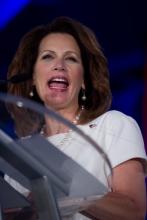
WASHINGTON, D.C. — Accusations by Rep. Michele Bachmann, R-Minn., that an Islamist group has infiltrated the U.S. government are drawing fierce criticism from fellow lawmakers and religious groups.
Bachmann and four other GOP legislators have sent letters to five government agencies citing "serious security concerns" about what Bachmann has called a "deep penetration in the halls of our United States government" by the Muslim Brotherhood.
Bachmann also accused Huma Abedin, an aide to Secretary of State Hillary Rodham Clinton and former Rep. Anthony Weiner's wife, of having family connections to the Muslim Brotherhood.
Sen. John McCain, R-Ariz., defended Abedin. "These attacks on Huma have no logic, no basis and no merit, and they need to stop now," he said in a Senate speech on Wednesday.
Bachmann's letters cite a report by Frank Gaffney, a conservative who has accused President Obama of "embracing the agenda of the Muslim Brotherhood."